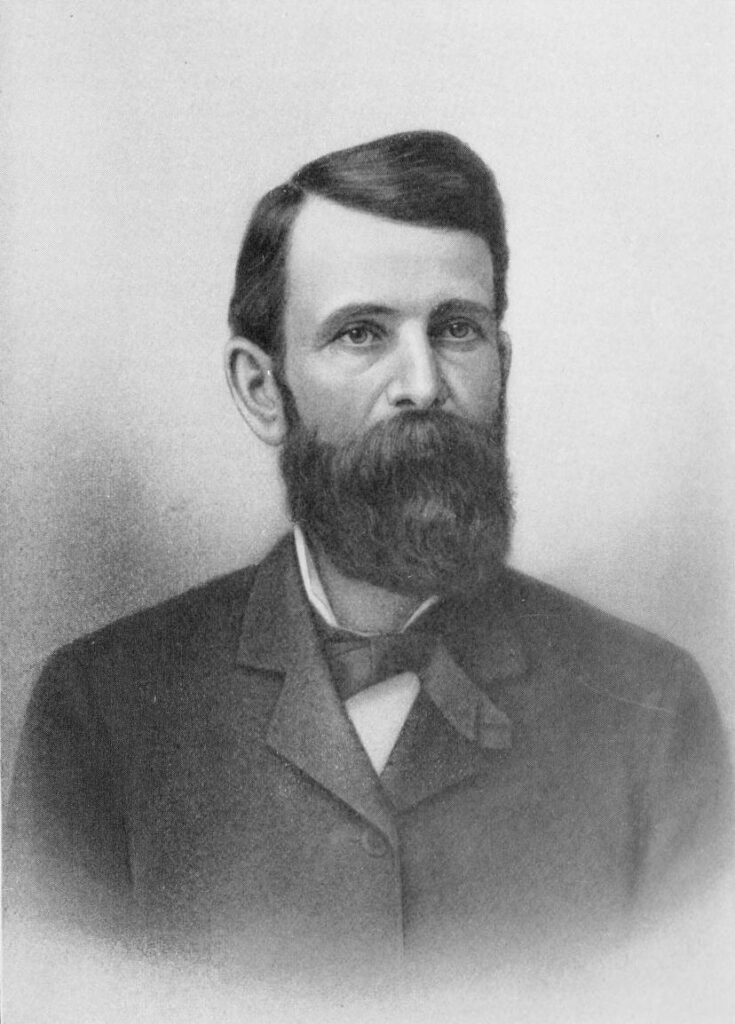Ebenezer Erskine Wilson, born November 21, 1838, in Pennsylvania, was a key figure in the establishment of Independence, Kansas, where he became the first merchant and a respected civic leader. He served valiantly in the Civil War, rising to the rank of Captain. Wilson’s influence extended to serving as mayor and county treasurer and holding the postmaster position until his death on August 28, 1894. He married twice, and his legacy continued through his children, particularly Albert E. Wilson, who followed in his civic footsteps.

EBENEZER ERSKINE WILSON—One of the incorporators of the county seat of Montgomery county and the pioneer merchant of that city, was the late subject of this memoir, E. E. Wilson. His life, from that August day in 1869, when he first occupied a spot on the Independence townsite, to the day of his death, August 28th, 1894, was a leading and active spirit in the public affairs of the county and by the character of his citizenship won the confidence and esteem of his city and county.
Ebenezer E. Wilson was a native of the “Keystone State.” He was born at Elizabeth, in Allegheny county, November 21st, 1838, and was reared on his father’s farm. His father provided him with only the advantages of a country school education. When the Rebellion came on his patriotic enthusiasm led him to enlist as a private soldier at McKeesport, Pennsylvania, April 22nd, 1861, but he was rejected because of a crippled hand. September 25th, of the same year, he enlisted in Company “C,” of the 2nd West Virginia Cav., and passed into the service without question. His record shows his service to have been meritorious and he received promotions from the ranks to a captain’s commission, as follows: Sergeant, November 1st, 1862; Orderly Sergeant, October 16th, 1863; Second Lieutenant, April 9th, 1864; First Lieutenant, November 26th, 1864; Captain, January 7th, 1865, and, as such, was mustered out at Wheeling, West Virginia, June 30th, 1865.
Returning home he remained a citizen of his native state ’till March, 1867, when he immigrated to Kansas, settling at Fontana, where he maintained his residence ’till August, 1869, when he drove into Montgomery county with the goods necessary to stock a small store in the proposed town of Independence. It was the first stock of goods brought to the place and the expense of getting them to their destination was $2.25 per hundred pounds. The building in which he installed it was one with dimensions 14×24 feet, and cost $500.00. It was one story high and the business that was done within its walls rendered it an important mart of trade in those days. In company with F. D. Irwin, he began business October 1st, and the partnership lasted two years. He was one of the earliest business men of Elk City, where he was identified perhaps two years, but his chief concern was for his favorite, Independence, and he maintained his residence there in almost unbroken continuance for twenty-five years. His high standing as a citizen commended him to the best consideration of the voters of the town and county and he held several offices, beginning with that of Mayor of Independence. He was a member of the board of trustees, who incorporated the town July 23rd, 1870, and the next year was elected its chief executive officer. In 1874, he was appointed deputy county treasurer and did the work of the office as such ’till 1882, when he became treasurer himself. He was appointed postmaster of Independence by President Harrison, and died the incumbent of the office. He was prominent in the Grand Army, was post commander of McPherson Post, and was president of the Independence Reunion in 1881 and 1882.
Mr. Wilson was first married to Rebecca Braden, a lady of Washington, Pennsylvania, who died in a few months. At Grand View, Illinois, January 30th, 1872, he married Morna Moore, a native of Knox county, Illinois. January 30th, 1890, she died, leaving children: Zell, wife of Assistant General Freight Agent of the Mo. Pac. Ry., Arthur T. Stewart, of St. Louis, Mo.; Albert E., manager of the Hall-Baker Grain Co.’s elevator business in Coffeyville; Sallie B. and Floyd M., twins, born March 15th, 1878; Jennie M., wife of Thomas E. Wagstaff, of Coffeyville, born May 25th, 1880; and George T., born March 24th, 1883, who is in the state grain inspection department at Coffeyville.
Albert E. Wilson, second child of our subject, was born in Independence, Kansas, February 24th, 1876, and grew up and was educated in the public schools of that city. He took a course in short-hand in St. Louis, Mo., and at nineteen years of age began life as stenographer for Hall and Robinson, in the grain business in Coffeyville. He filled this position eighteen months and was then made the company’s bookkeeper, in which capacity he served two years, being then made manager of the firm’s business in Coffeyville, in 1899. This firm was one of the leading exporters of grain in the west and their business in Coffeyville marks this city as one of their most important points.
Like his father, Mr. Wilson is a Republican, and was a delegate from Montgomery county to the state convention at Wichita in 1902, where he helped nominate W. J. Bailey for Governor of Kansas. He is committeeman for the third ward of Coffeyville and is secretary of the city central committee of his party. He is a Master Mason, an Elk and is unmarried.
Source
Duncan, L. Wallace. History of Montgomery County, Kansas: By Its Own People. Illustrated. Containing Sketches of Our Pioneers — Revealing their Trials and Hardships in Planting Civilization in this County — Biographies of their Worthy Successors, and Containing Other Information of a Character Valuable as Reference to the Citizens of the County; Iola, Kansas : L. Wallace Duncan, 1903.
Discover more from Kansas Genealogy
Subscribe to get the latest posts sent to your email.
